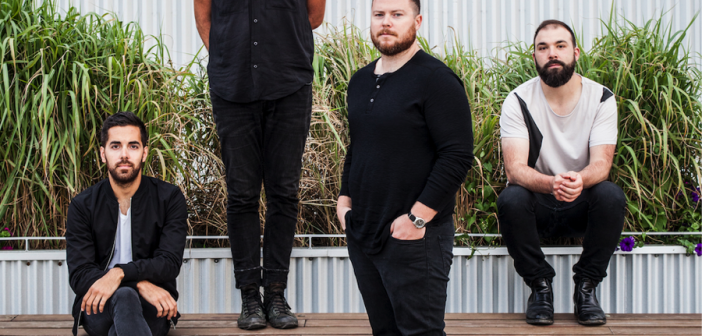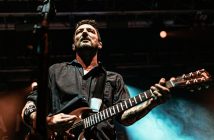Contrary to the name, Halifax, CA group In-Flight Safety likes to live dangerously. The pop-rock group released their second full-length album this past September and have been touring across the U.S., Canada, and Europe in support. Recently, the band took some time to break down the album track by track to give us an inside look at their newest release, Conversationalist.
Check out In-Flight Safety’s Conversationalist on Spotify!
Before We Were Animals
John: This song was not at all planned. This was as spontaneous as it gets for us. It happened one day in the studio when I was working with my engineer friend Kirstan Moore while recording guitars. I was getting loopy – as you do when you record for 8 hours straight – and messing around with the piano, joking about how Animals sounded pretty cool as a piano ballad. He basically said: “You should record it that way”. And I gave it a shot. Glen really liked it and the concept of the song was born. The whole song only took about 45 minutes to record. I wish that was the case for the other tracks on the record.
Animals
John: This song is trip for people who know our band. I don’t think we’ve ever played anything in the 150 bpm tempo range before. It’s a ripper. A lot of the stuff we were really digging while writing had a big influence on this track: dark 50s rock/melodic punk rock. We were hitting The Vaccines record (What Did You Expect) really hard and also revisiting Ramones, The Strokes and The Stills. From day one we know this song was going to be catchy but I don’t think we knew that it was going be such a big song for us. Proud papa.
Glen: There are always the songs that come together quicker than others, that’s not too say that they are any less good, in fact they often end up being first singles…they are the songs on the record that listeners understand immediately. From the first time we played Animals it had a lot of energy and subsequently became the fastest paced song we’ve written to date. It’s an exciting song for our audience and us.
Blue Flares
John: This is hands down one of my favorite songs we’ve ever done. There was something about the space and simplicity of the song that had me super excited. It’s so straight ahead that and that, to us, made it so badass. #NormCore. We didn’t go for all the regular layers and layers at the chorus and just let the song breathe. For the lyrics I was thinking about that scene in Lord of The Rings when Aragorn is carried off by his horse and that became a visual reference. Horses saving humans. I like that.
Glen: This is perhaps my favourite song on the record. We’ve always tried to elevate choruses by creating dynamic and/or rhythmic shifts…within the chorus of Blue Flares its all melodic, the groove just lays right back, it’s a different song for us and I’m really glad its on the record.
Stockholm
John: Stockholm was always going to be about Stockholm syndrome. I just wasn’t sure how and why. But at least I knew that much. The song was trucking along pretty well in the recording studio but when we centered on that synth arpeggio at the chorus we knew we had something magic and danceable. Chris plays the bass with such intention and swagger on this song. I love listening to his bass moves in the outro.
Glen: Every band is guilty of writing and producing songs without thinking even for a moment how they might be performed in a live show; Stockholm is one of these songs. It is however songs like these that push a bands live show forward and we are glad for it.
Destroy
John: This is the oldest brother of the song family. It had been around as an idea in about 2010. We had the guitar melody that kicks in with the song and I had these lyrics: “destroy… we’ll write it down” for the chorus. Trying to make this song fit with all the other tracks on Conversationalist was really tough. That was one of the biggest challenges of making this record. We ended up using the synth pad as a recurring character and it made an appearance in this track. That really brought the song home. I like the references to hunting and roaming in the woods. The song switches perspectives from the hunters to the family of deer in the 4th verse. The idea of killing what we love in order to survive hit me really hard. That concept inspired the lyrics of Destroy.
Glen: Destroy is an oldie but a goody. It was written alongside a collection of songs we pursued a few years ago with a different iteration of the band. While other songs fell by the waist side or proved not to be heading in the direction we wanted Destroy prevailed. It was indicative if where we wanted to go with the record, a compass.
Caution Horses
John: This is a curious song title to many people. I was on tour last summer and saw it printed on the side of a horse trailer. I didn’t think about it much but I wrote it down. When gathering up ideas for the songs that would be on this record I revisited that title. I think what spoke to me is the idea that horses are beautiful, necessary creatures, but they can kick you in the face and it’s lights out. My favorite line of the album is in this song: “I’ve been hiding out, and wearing all the right clothes”. It’s that thing of being ready to take on the world but not totally sure what you are supposed to doing. I still identify with that concept.
Glen: Caution plays an invaluable role within this collection of songs and offers listeners a much needed down moment. The song offered yet another opportunity on the record to combine acoustic and digital percussive elements, something I had been hoping to explore, really happy with how it turned out.
Tie A String
John: This song was kicking around for ages. For a while we fancied it with an acoustic guitar for rhythm. Then we added the rock guitars back to it. It sat unfinished for a long, long time. The mystery was solved for me when I realized the entire song was about the pre-chorus. “I saw murder, I saw blood in your eyes”. Once I wrote that part I knew what was going on. The chorus was more of a fleeting moment and focus should be on the pre-chorus. I always pictured this spirit rising up above this body (mine?) and witnessing its own murder. That was a metaphor obviously but it creeped me out. But sometimes creepy is the right vibe.
Glen: Although it was first conceived well before the rest of the songs on this record Tie A String was one of the last to be finished. It wasn’t until the bass line was rewritten that we started to see the finish line and understand what kind of song it was.
Crowd
John: This song was never really meant to have any vocals as central focus. But later I came up with that one line that repeats over and over- hence the song title. Glen and I were really excited about building a song piece by piece with no thoughts to how the vocals would exist. We used the vocals like another instrument. We also used synth bass instead of guitar bass – that was new for us. The main melodies come from guitars and synths. I really like that. I listen to a lot of instrumental music (like Tycho) and it moves just as much as vocal music.
Glen: We put away a lot of the conventional instrumentation we often use and tried to push ourselves out of our comfort zone. Crowd is a very expressive song; it has a lot of emotion behind it.
Fight Night
John: This was the last song we recorded for the album. We were trying to marry the worlds of The Cure and Shout Out Louds with the dark 50s rock thing. I think it worked quite nicely. The song needed a strong lyrical personality for it to feel finished. I was thinking about the dirty streets of NY and this old boxer as the central character. He’s been beat up a bunch but it looking for a way to heal. Perhaps at a bar on Rivington St perhaps in the arms of someone who loves him.
Glen: If anyone can shed any light on the timing of this song we would greatly appreciated it. This is about as prog rock as we get- which is not a lot. Sometimes you have to forget logic and follow the melody wherever it takes you.
Firestarters
John: This song is one of my favorites. We bucked the traditional verse, chorus, verse, chorus, bridge, chorus, outro template we use a lot. It was fun for me to let me voice lead a bit in the first act of the song. I had fun playing with vocal inflection and the lyrics. There is reference to Morissey in the lyrics “There is a light that will never go out”. That pleases me for no reason other than I love The Smiths. We could have never predicted how the percussion outro would be such a fun part of the live show. I am glad we left that in the track it was 50/50 for a while.
Glen: Looking back I’m really glad we were able to recognize that this song has two faces, there is a first and second act. Often with songs you may try to reconcile two approaches that you hold dear, and that can lead to the degradation of each idea and subsequently a sub par song. It’s worth mentioning that it’s also a lot fun to play live.




